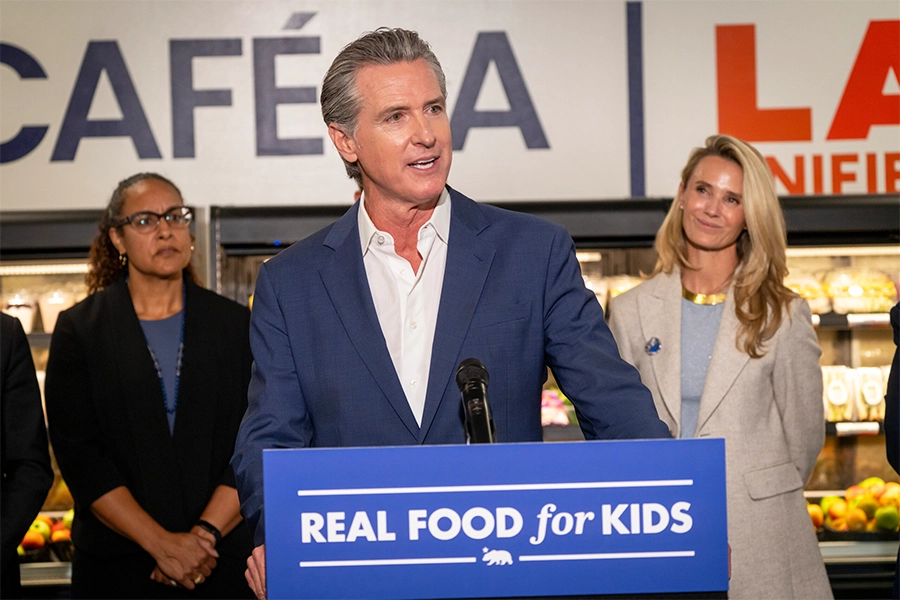
- Industry news
Industry news
- Category news
Category news
- Reports
- Key trends
- Multimedia
- Journal
- Events
- Suppliers
- Home
- Industry news
Industry news
- Category news
Category news
- Reports
- Key trends
- Multimedia
- Events
- Suppliers
Healthy school lunches: California’s ultra-processed food ban sets new standard
Key takeaways
- Assembly Bill 1264 mandates the elimination of UPFs from public school meals.
- The law aims to address growing health concerns, such as obesity and diabetes, linked to UPFs.
- Some industry groups oppose the Bill due to potential cost increases and challenges defining what qualifies as a harmful UPF.

California has introduced a pioneering law to eliminate ultra-processed foods (UPFs) from public school meals — the first US state to enact such measures. Assembly Bill 1264, signed by Governor Gavin Newsom last week, requires schools to begin phasing out UPFs by July 2029, with a complete ban by July 2035.
The Bill, which also requires vendors supplying UPFs to schools to comply by 2032, received overwhelming bipartisan support. Health organizations welcomed the measures for addressing the growing concerns around the negative impacts of UPFs on human health, including obesity, diabetes, and heart disease.
In July 2025, the federal Centers for Disease Control (CDC) reported that 32.7% of children and youth between 12–19 years old are prediabetic. The National Institute of Health and the CDC have also identified the link between healthy eating and lowering an individual’s risk for chronic diseases.

“UPF are industrially manufactured and chemically modified products,” says The Environmental Working Group. “They’re often made with potentially harmful additives to enhance taste, texture, and appearance.”
“The new law creates a first-ever legal definition of UPF in the US. Food will be considered UPF if it’s high in saturated fat, added sugar, or sodium, and contains a food additive such as flavor, artificial color, emulsifier, or a thickening agent.”
There have been over 130 similar bills introduced in state legislatures across the US in 2025, reflecting the increasing focus on improved nutrition for children.
Opposition to Assembly Bill 1264
A big challenge with regulating UPFs is that it is difficult to define what they are. Moreover, some processed foods like tofu and whole-grain bread are processed but also nutritious, creating concerns that overly broad restrictions could inadvertently impact some healthy foods.
“For foods served in schools, food and beverage manufacturers meet the rigorous, unique safety and nutrition standards set by the USDA and state agencies,” says John Hewitt, SVP Packaging & Sustainability and State Affairs at the Consumer Brands Association (CBA).
Bill 1264 aims to tackle the definition challenge by mandating the California Department of Public Health to clarify what constitutes harmful UPFs by mid-2028.
The Institute of Food Technologists evaluated UPFs earlier this year, including their definition under the Nova food classification system, which some experts believe is too broad and needs refinement.
The Nova food classification system categorizes foods into four groups: unprocessed or minimally processed, processed culinary ingredients, processed, and ultra-processed foods.
Meanwhile, some food manufacturers and industry groups have reportedly opposed the Bill because it could raise costs. The law does not include additional funding for school districts to implement the changes.
“You’re borrowing money from other areas of need to pay for this new mandate,” says Troy Flint, chief information officer at the California School Boards Association. Governor Gavin Newsom speaks after signing a law to eliminate ultra-processed foods from public school meals.
Governor Gavin Newsom speaks after signing a law to eliminate ultra-processed foods from public school meals.
California’s health initiatives
California’s work to promote healthier school food long predates the national “Make America Healthy Again” movement. Since taking office, Governor Gavin Newsom has advanced a series of first-in-the-nation reforms to eliminate toxic additives, strengthen nutrition standards, and expand healthy food access in schools statewide.
In January, Governor Newsom signed an executive order directing state agencies to recommend potential actions to limit the harms associated with UPFs and food ingredients that pose a health risk to individuals.
Newsom also introduced a law last week requiring prenatal multivitamin manufacturers to test for and publicly disclose levels of toxic heavy metals, including lead, arsenic, cadmium, and mercury in their products.
He previously signed bills banning four potentially harmful chemical food additives from products sold statewide, including red dye 3 and brominated vegetable oil, often used as a stabilizer in citrus-flavored beverages, and prohibiting schools from serving foods containing synthetic food dye additives associated with risks to children.
Walmart recently announced it will remove 11 synthetic dyes and 30 controversial ingredients, including certain preservatives, artificial sweeteners, and fat substitutes, from its private-brand food products.
In 2024, Governor Newsom signed a legislative package to increase enrollment in state food assistance programs, reduce youth consumption of processed foods, and increase access to healthy, locally grown food in all California communities.











